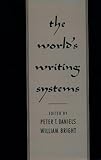http://en.wikipedia.org/wiki/Indus_script
is a writing system at all, rather than the kind of ornamentation from a pre-proto-writing stage known in several other sites of ancient civilizations. (As a reality check, we can remember that several regions of the world had elaborate empires and cities with extensive trade routes but without writing.)
Some of the controversy about this issue arises because of the extreme sensitivity of cultural heritage claims in south Asia in a region that spans a heavily militarized border. A good popular book about the nature and origin of writing systems in general, worldwide, is Visible Speech by John DeFrancis,
http://www.amazon.com/Visible-Speech-Diverse-Interactions-Co...
and the definitive compilation of international research on writing systems to the date of publication is The World's Writing Systems
http://www.amazon.com/Worlds-Writing-Systems-Peter-Daniels/d...
edited by Peter T. Daniels and William Bright and published in 1996. I haven't concluded absolutely that the Indus Valley Script could not be a writing system, but there is no sure evidence that it is, and the earliest attested writing system in a nearby region is the Brahmi script
http://en.wikipedia.org/wiki/Br%C4%81hm%C4%AB_script
that is much more recent in time (a few centuries older than the common era, that is approximately 2,300 years old) and unquestionably based on the scripts of the ancient Near East.
The late John DeFrancis, who through his innovative textbooks was the first teacher of a whole generation of Americans who succeeded in acquiring Chinese as a second language, was a co-founder of the Journal of the Chinese Language Teachers Association, and author of a fascinating article titled "Why Johnny Can't Read Chinese." The Chinese writing system (no matter which form of the spoken language, ancient or modern, it is applied to) is full of ambiguities and other partially cued information that slows down reading--as is every other writing system in the world. By dint of much practice, I can read Chinese comfortably for information on a variety of subjects. By test, I was one of the most proficient readers of Chinese among second-language learners who participated in the norming rounds for a Test of Chinese as a Second Language in the mid-1980s (which I think was never rolled out into regular use, perhaps because it showed that most learners learned more Chinese from overseas residence than from taking university courses in Chinese).
Hacker News readers who would like to learn about English, Chinese, or other writing systems would be well advised to read the specialized articles in The World's Writing Systems
http://www.amazon.com/Worlds-Writing-Systems-Peter-Daniels/d...
edited by Peter T. Daniels and William Bright. The article on Chinese is very good, and the overview articles that discuss general features of writing systems are also very good.


AFTER EDIT: As usual, I would be happy to hear a rationale for the disagreement that is evidently being expressed regarding this comment. Please show your capacity to teach me (and onlookers) something. I'll mention here that I have studied a variety of other languages (those are disclosed in my Hacker News user profile), including Chinese, and I have made specialized study of the origins of writing around the world. That's my basis for judging the plausibility of various claims about the ancient Harappan inscriptions. A book on that topic I highly recommend, because it is written by very knowledgeable historical linguists, is The World's Writing Systems, edited by Peter T. Daniels and William Bright. There has been a little bit of new work on Harappan inscriptions since that book was published, with several claims and counterclaims by competing scholars, but no settled demonstration that the Harappan inscriptions are writing at all, and certainly no settled demonstration of what they are writing about, if anything (as the article submitted here acknowledges).
[1] http://www.amazon.com/Worlds-Writing-Systems-Peter-Daniels/d...